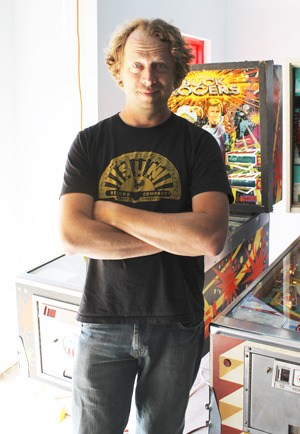Tim Leonard is on top of his game.
The Langley resident, artist and owner of Heavy Metal Works has been working on projects scattered throughout Whidbey Island for years. His work includes renovation of the Whidbey Telecom phone booths and production of the Useless Bay Coffee Company tables, umbrellas, outdoor performance building and railings, production of various lighted signs and residential items, and recently a “Spy a whale, ring the bell” sign at Hladky Park.
But despite his heavy-duty day job, it is the rejuvenation of a classic pastime that really gets him enthused.
As a kid growing up in Maryland, Leonard enjoyed the interactivity, artistry and plain old-fashioned fun of the pinball machine. The affinity with the fast-paced, all-up-to-chance game was rekindled when Leonard, who recently began doing more work with neon lighting, came across a discarded pinball machine in Hanford, Wash.
The idea of restoring old machines had been simmering in Leonard’s mind for years prior, but it never felt like the right time to start until that moment.
“I saw it on Craigslist, and I was like ‘That’s it, that’s the one. Here we go,’” he recalled.
“After I started doing the lighting with the neon signs, it just seemed natural that pinball was next because it is still mechanical. I love the artwork. I love the lights. And I love [fixing] them so that people can play with them.”
Leonard said he has approximately 11 in his house presently with about five in his living room, which he plays regularly. Xenon, manufactured in 1980 as the first talking pinball machine to feature a female voice, is Leonard’s current favorite. It is also one he has yet to find.
Giuseppe Landrum-Recchi, a barista at Callahan’s Firehouse, said the Buck Rogers machine is “by far the best.”
“Each one is so different. All of the elemental parts are the same, but the way they are assembled, the way somebody sat down and designed each game individually and somebody sat down and designed the artwork … I appreciate the amount of effort that went into constructing these machines.”
Leonard explained that there are both electric and mechanical machines, and noted that the electrical ones tend to have the problems one might expect: “chips and transistors fry,” etc. The mechanical machines, he continued, usually decline due to lack of play.
Aside from repairs, Leonard said a great deal of his enjoyment in the project comes with the hunt for his next machine.
“I like finding them, the hunt, meeting the people who own these machines,” he said. “They’re very interesting characters.”
Leonard added that, while some collectors of pinball machines, like a seller named Carl he once encountered, amass hundreds of machines in their lifetimes, collecting is not his goal.
“You hear stories about people like that who have 200 machines in their house and they have to add storage units on their property to put all of the machines in. I want to put them back out in the community and have South Whidbey be pinball mecca someday,” he said.
Leonard’s machines were housed in Sundance Bakery prior to its closing. There is also one in the lobby of the Whidbey Children’s Theater and six in the back of Callahan’s in Langley. A bowling alley, Leonard said, will likely also house some. One of Leonard’s two renovated Sky Lab machines will be donated and available for purchase at an upcoming Whidbey Island Center for the Arts auction.
After his work is done, Leonard’s final reward is seeing the neon lights of the pinball machines reflected in the excited eyes of kids and adults enjoying the game, sometimes for the first time.
Leonard recalled a few occasions when he met adults older than himself who had never played the game before. He also said he has come into Callahan’s to be greeted by a swarm of 8-year-olds “dancing and jumping up and down and going crazy over it.”
Mikayla Schumacher, another barista at Callahan’s, confirmed that she has often encountered groups of kids and adults who come in to play the machines and said she enjoys playing the older games herself. “It’s just really fun,” she said.
“That’s the funnest thing; it isn’t about the money, it’s not a money-making operation at all,” said Leonard. “It’s about exposing people young and old to a form of entertainment that doesn’t involve computers. It’s more interactive, more prone to chance.”
In much the same way, Leonard’s pinball machine purchases are often a gamble. Two of the machines in Callahan’s, he said, worked fine when he picked them up. Another required 30 hours of work and a great deal of problem-solving. Once he had restored the latter, Leonard said, “it felt like I could fix anything.”
“The ultimate goal is to learn how they work and design my own, to get other people involved, especially artists,” he said. “That’s not my strong suit, but there are so many wild artists out here I think that would be a great platform to play with.”



